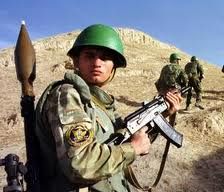NBC News (24 September 2018)
Iranian President Hassan Rouhani told NBC News Monday that he had no plans to meet President Donald Trump during his visit to New York, saying the United States had employed only threats and sanctions against his country.
"There is no such program for a meeting," Rouhani said in an exclusive interview with "NBC Nightly News" anchor Lester Holt, saying conditions were not ripe for talks.
Rouhani, in New York for the annual U.N. General Assembly session, accused the U.S. of adopting a hostile stance toward Iran and turning its back on diplomacy after its unilateral withdrawal from a nuclear agreement between Iran and world powers.
"Naturally, if someone is keen on having a meeting and holding dialogue and creating progress in relationships, that person would not use the tool of sanctions and threats [and bring] to bear all of its power against another government and nation," Rouhani said. "That means that the necessary willpower is absent in order to resolve outstanding issues."
Watch Lester Holt’s exclusive interview with Iranian President Hassan Rouhani tonight on "NBC Nightly News With Lester Holt."
After having met with North Korean leader Kim Jong Un in an unprecedented summit in June, Trump and his deputies have held out the possibility of talks with the Iranian president. A year ago, following a tough speech blasting Iran at the U.N. General Assembly, Trump reportedly asked for a meeting with his Iranian counterpart but was rebuffed.
Rouhani ruled out Washington's diplomacy with Pyongyang as a possible model for U.S.-Iran relations, though he left the door open to other efforts to reduce tensions. "The North Korean model cannot be a correct model, because we cannot draw such comparisons. But certainly there are different models out there that can be used."
As a precondition for any dialogue, Rouhani said the U.S. would need to repair the damage done by exiting the 2015 nuclear deal. "That bridge must be rebuilt," he said.
The Iranian president, re-elected to a second four-year term in 2017 on promises of opening up the troubled economy to more foreign investment, portrayed the U.S. as diplomatically isolated over its withdrawal from the nuclear agreement.
Rouhani said his country could withstand U.S. economic sanctions and called Washington's threats to choke off Iranian oil exports an "empty promise."
"The United States is not capable of bringing our oil exports to zero," Rouhani said.
"It's a threat that is empty of credibility. Perhaps on this path, we will sustain certain pressures but certainly the United States will not reach its objective."
The 2015 nuclear deal, signed by the United States, China, Russia, Britain, France and Germany after more than two years of negotiations, imposed strict limits on Iran's nuclear program in return for lifting crippling international and U.S. sanctions on the country.
Since Trump pulled the U.S. out of the accord in May, the United States reimposed a first tranche of economic sanctions in August and is due to reintroduce sanctions on Iran's oil and gas industry on Nov. 4. The other countries that signed the deal, including European allies, have stayed in the agreement, though major European firms have begun pulling out of Iran to avoid getting hit by U.S. sanctions.
India, China, Turkey and other countries are seeking waivers or exemptions for the energy-related sanctions that are designed to squeeze Iran's oil exports, a crucial source of revenue for the Islamic Republic.
During his visit to New York, Rouhani was due to meet leaders from the other signatories to the agreement to confer about how to keep the deal alive despite U.S. sanctions.
In the interview, Rouhani said Iran would remain in the agreement, known as the Joint Comprehensive Plan of Action (JCPOA), despite Washington's withdrawal, as long as the other signatories held up their end of the deal to open the door to trade.
"Until such time that our interests are guaranteed with the five remaining countries, we will remain within the JCPOA," Rouhani said, adding that "a one-sided agreement would be meaningless."
https://www.nbcnews.com/news/world/citing-u-s-sanctions-iranian-president-says-he-has-no-n912496
No comments yet.
-
 RUSSIA HOLDING MILITARY EXERCISE IN TAJIKISTAN
Asia - Pacific
25.09.2018
RUSSIA HOLDING MILITARY EXERCISE IN TAJIKISTAN
Asia - Pacific
25.09.2018
- CHINA SAYS IT CAN'T HOLD US TRADE TALKS WITH 'KNIFE TO THE THROAT' Asia - Pacific 25.09.2018
- IRAQ'S SOUTHERN CRUDE OIL EXPORTS APPROACH RECORD Iraq 25.09.2018
- IMRAN KHAN CRITICISED FOR OFFERING TO HOLD TALKS WITH INDIA Asia - Pacific 25.09.2018
- ROMANIA PLEDGES TO INCREASE GAS EXPORT CAPACITY 40 TIMES TO DODGE EC PROBE The Balkans 25.09.2018
-
25.01.2016
THE ARMENIAN QUESTION - BASIC KNOWLEDGE AND DOCUMENTATION -
12.06.2024
THE TRUTH WILL OUT -
27.03.2023
RADİKAL ERMENİ UNSURLARCA GERÇEKLEŞTİRİLEN MEZALİMLER VE VANDALİZM -
17.03.2023
PATRIOTISM PERVERTED -
23.02.2023
MEN ARE LIKE THAT -
03.02.2023
BAKÜ-TİFLİS-CEYHAN BORU HATTININ YAŞANAN TARİHİ -
16.12.2022
INTERNATIONAL SCHOLARS ON THE EVENTS OF 1915 -
07.12.2022
FAKE PHOTOS AND THE ARMENIAN PROPAGANDA -
07.12.2022
ERMENİ PROPAGANDASI VE SAHTE RESİMLER -
01.01.2022
A Letter From Japan - Strategically Mum: The Silence of the Armenians -
01.01.2022
Japonya'dan Bir Mektup - Stratejik Suskunluk: Ermenilerin Sessizliği -
03.06.2020
Anastas Mikoyan: Confessions of an Armenian Bolshevik -
08.04.2020
Sovyet Sonrası Ukrayna’da Devlet, Toplum ve Siyaset - Değişen Dinamikler, Dönüşen Kimlikler -
12.06.2018
Ermeni Sorunuyla İlgili İngiliz Belgeleri (1912-1923) - British Documents on Armenian Question (1912-1923) -
02.12.2016
Turkish-Russian Academics: A Historical Study on the Caucasus -
01.07.2016
Gürcistan'daki Müslüman Topluluklar: Azınlık Hakları, Kimlik, Siyaset -
10.03.2016
Armenian Diaspora: Diaspora, State and the Imagination of the Republic of Armenia -
24.01.2016
ERMENİ SORUNU - TEMEL BİLGİ VE BELGELER (2. BASKI)
-
AVİM Conference Hall 24.01.2023
CONFERENCE TITLED “HUNGARY’S PERSPECTIVES ON THE TURKIC WORLD"









